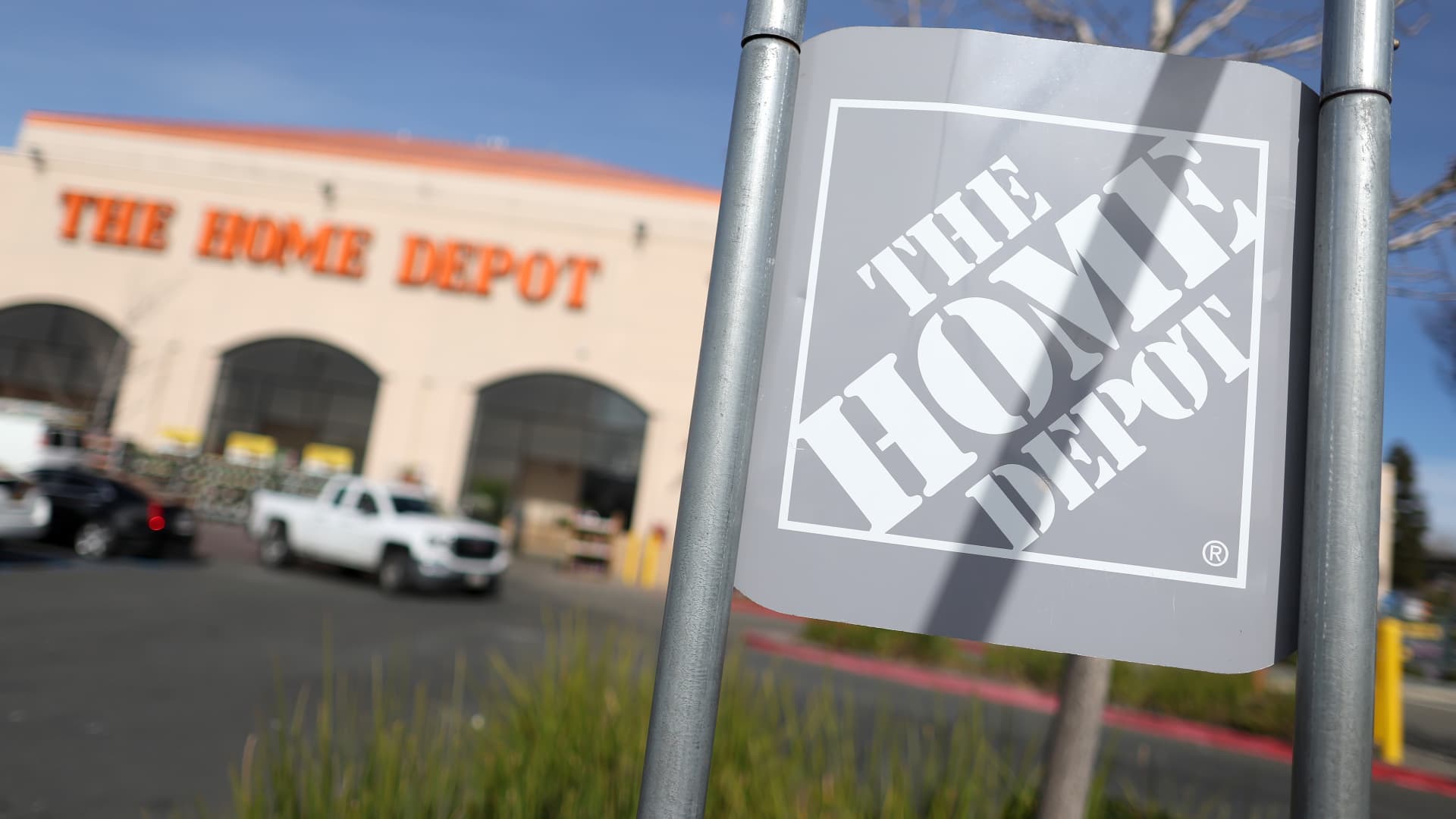A sign is noticed displayed on the exterior of a Home Depot store on February 21, 2023 in El Cerrito, California.
Justin Sullivan | Getty Images
Home Depot topped earnings expectations on Tuesday, but experienced a 2% decrease in sales compared to the previous year. Customers remained cautious about making significant purchases and undertaking major projects.
This is the first time in three quarters that the company has surpassed Wall Street’s revenue expectations.
Despite the positive performance, the Atlanta-based home improvement retailer maintains its conservative forecast for the fiscal year. It anticipates a decline in sales and comparable sales ranging from 2% to 5% compared to the same period last year. This forecast was revised downward in the previous quarter.
In an interview, Chief Financial Officer Richard McPhail stated that consumers continue to be cautious when it comes to larger, discretionary spending. Some homeowners have already made these purchases during the Covid pandemic, while others are likely delaying them due to higher interest rates.
McPhail also mentioned that certain pandemic-related dynamics are reversing. Transportation costs have decreased, and Home Depot is receiving fewer requests from vendors for price increases. Supply chain disruptions are mostly resolved.
“We do not anticipate significant inflation in the second half of the year,” said McPhail.
Here’s how the company performed in its fiscal second quarter compared to Wall Street’s expectations, based on a survey conducted by Refinitiv:
- Earnings per share: $4.65, higher than the expected $4.45
- Revenue: $42.92 billion, surpassing the expected $42.23 billion
Home Depot reported a net income of $4.66 billion, or $4.65 per share, for the three-month period ending July 30. This is a decrease from $5.17 billion, or $5.05 per share, in the same period last year. The company’s revenue also declined from $43.79 billion last year.
Shares of Home Depot closed slightly higher on Tuesday.
Home Depot faces a more challenging sales environment as demand for do-it-yourself projects and contractors normalizes after a period of unusually high demand lasting almost three years. McPhail, the company’s CFO, previously stated that 2023 would witness a return to pre-pandemic consumption patterns, leading to a year of moderation.
Furthermore, the retailer is impacted by a weakening housing market, inflation, and changing consumer preferences that prioritize spending on services rather than goods.
However, McPhail emphasized that Home Depot’s typical customers are in a strong financial position, largely due to substantial gains in home equity during the Covid pandemic. These customers are still engaging in home improvement activities, albeit on a smaller scale.
“Generally speaking, the homeowner customer, who is essentially our core customer, remains financially sound and actively pursuing home improvement,” he said.
Home Depot has noticed a reduction in inflationary pressures reflected in its sales trends. McPhail mentioned that the company has not experienced deflation but is currently going through a phase of “price settling.” In certain cases, Home Depot has lowered its retail prices. These reductions are not limited to any specific product category.
The company observed an increase in the number of customer transactions as the average amount spent by customers decreased.
According to FactSet, comparable sales in the United States and companywide declined by 2% in the fiscal second quarter. However, this outperformed expectations of a 3.9% decline. It marks the third consecutive quarter of declining comparable sales in the United States.
Total customer transactions decreased by approximately 2% compared to the previous year, but the average transaction amount remained relatively unchanged at $90.07.
During an earnings call, CEO Ted Decker noted that sales to professional home builders were stronger than sales to do-it-yourself customers, but both categories experienced a decline compared to the previous year. The backlog of projects for professional builders, which accumulated during the high-demand period of the pandemic, has decreased but remains elevated compared to historical levels.
In its earnings release, Home Depot announced that its board of directors approved $15 billion in share buybacks, effective immediately.
As of the close of the market on Monday, Home Depot’s share price has increased by 4% year-to-date, trailing behind the S&P 500’s gain of nearly 17%. On Monday, the company’s stock closed at $329.95, a decrease of less than 1%.
Denial of responsibility! VigourTimes is an automatic aggregator of Global media. In each content, the hyperlink to the primary source is specified. All trademarks belong to their rightful owners, and all materials to their authors. For any complaint, please reach us at – [email protected]. We will take necessary action within 24 hours.


